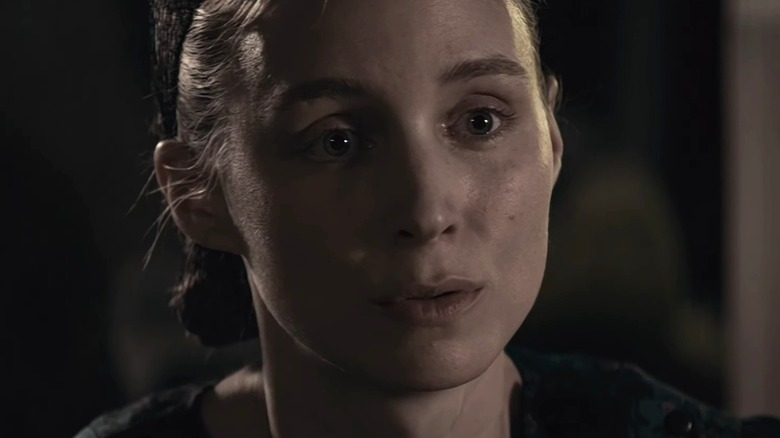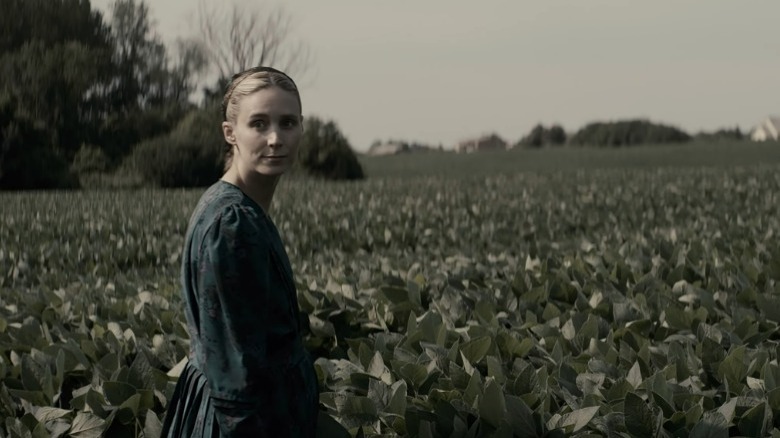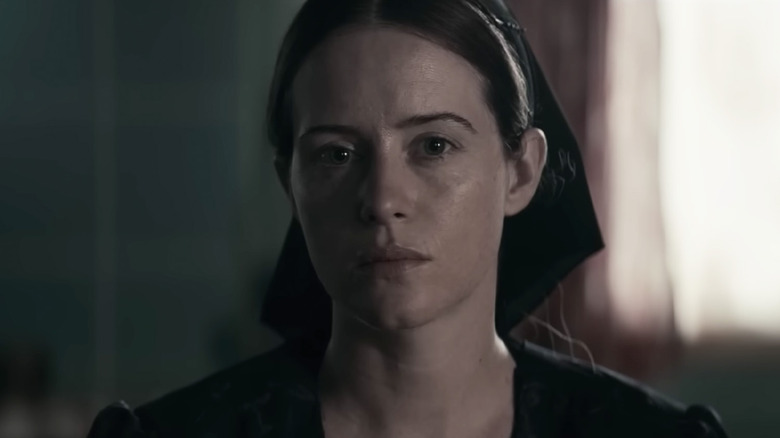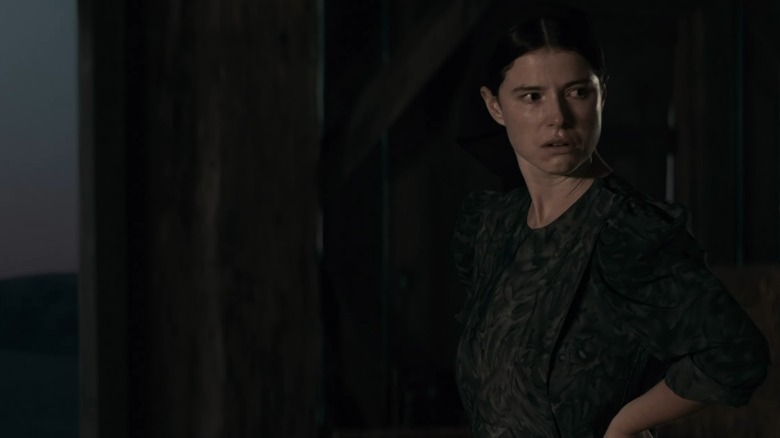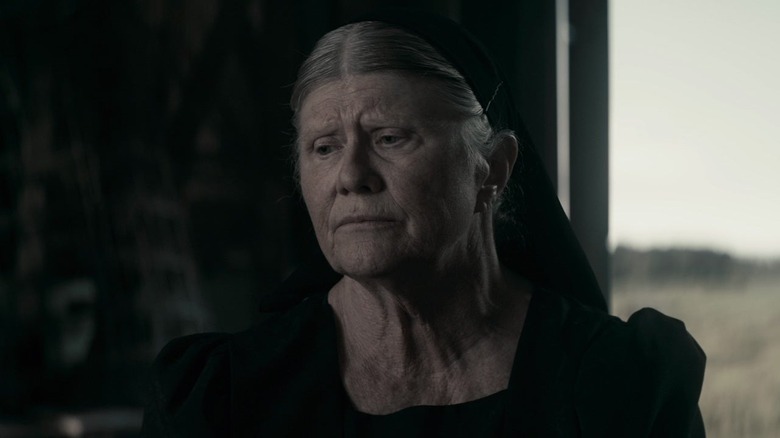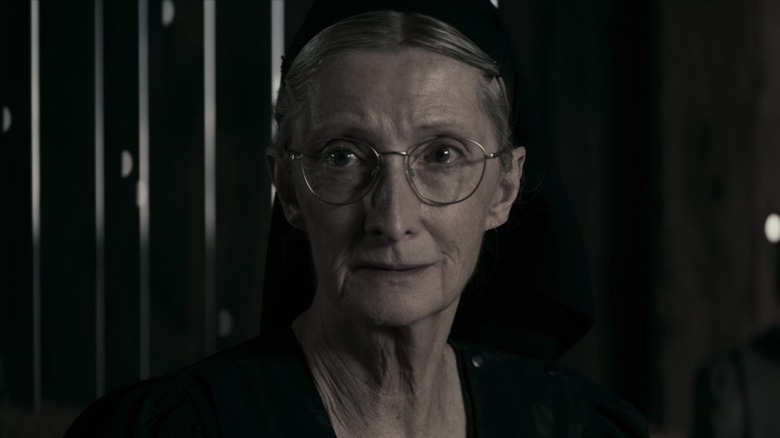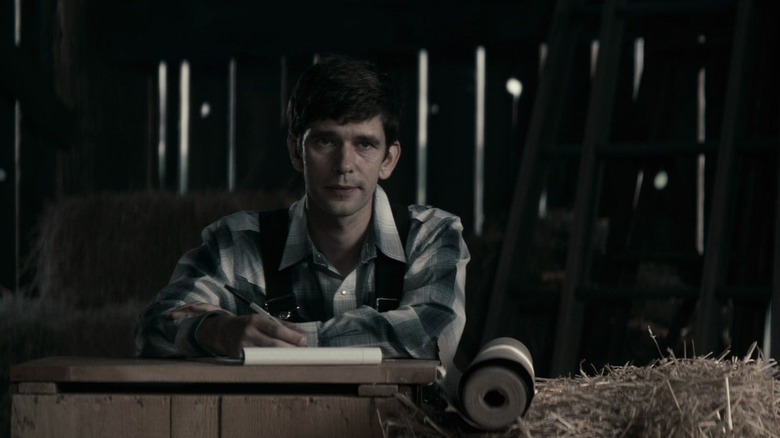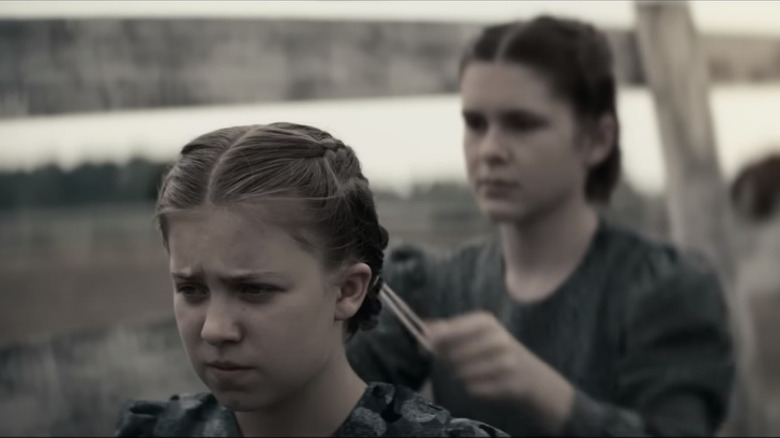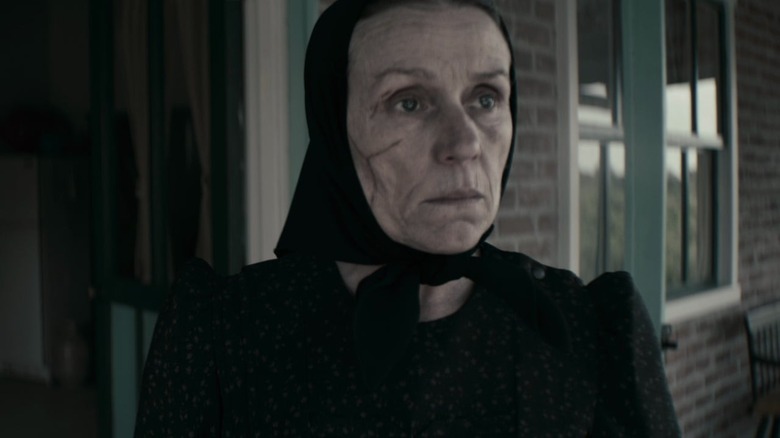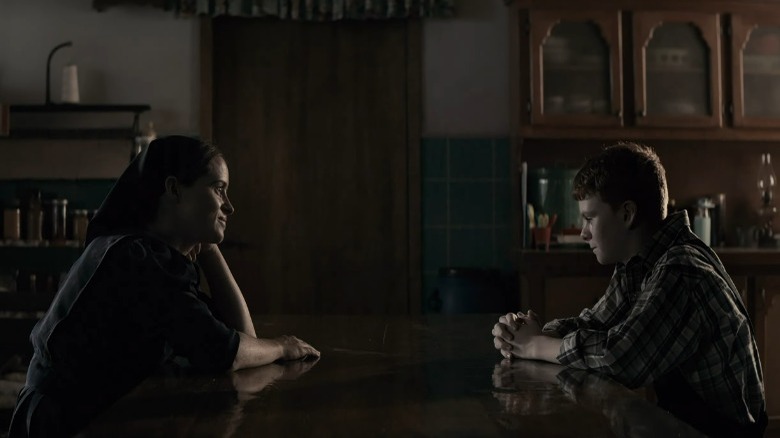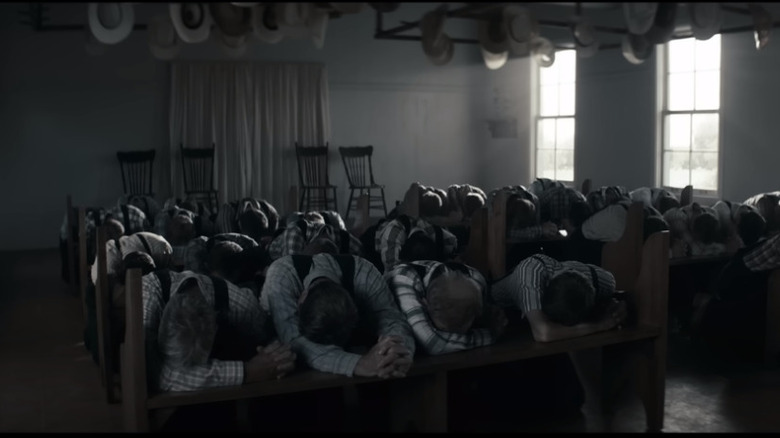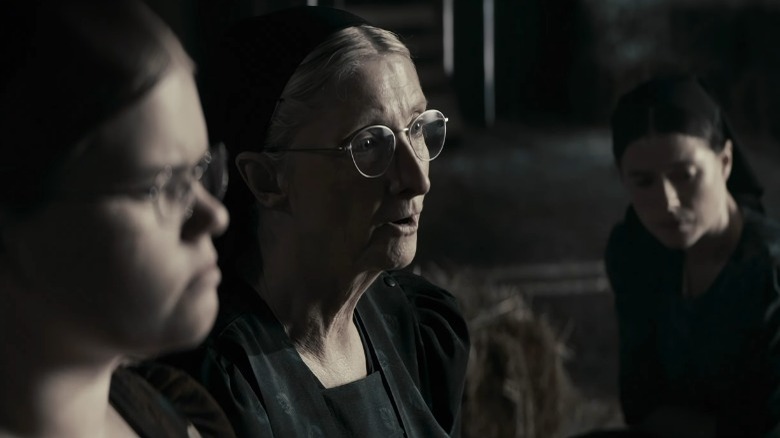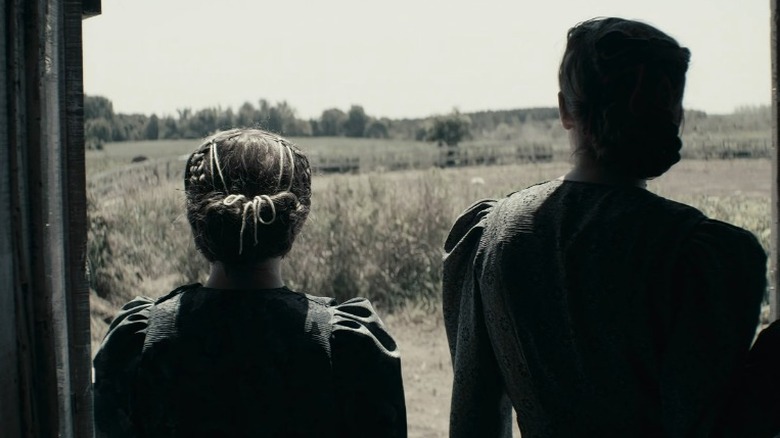The Ending Of Women Talking Explained
Sarah Polley's "Women Talking" emerged as one of the most acclaimed films of the 2022 film festival circuit, and in 2023 it finally entered wide release so more people would have a chance to see this must-watch indie movie. Set in a secluded religious colony where the men have been drugging and raping the women for a long period of time, the film follows a group of leading women in the community who must determine whether they will stay and fight the men or leave and start fresh. Both paths carry certain risks, and much of the film is devoted to watching the discussion unfold between the women before they finally follow through on the decisions made.
Since "Women Talking" features a substantial cast of great actors, and because numerous characters are given prominence in the film, there are many, many loose ends left to be explored by the time the film wraps up, from the fate of the women as a collective to the paths taken by certain key individual figures. So, let's talk about it all — this is the ending of "Women Talking," explained.
Ona's future
As the women tasked with determining the path forward assemble in the barn, it becomes clear right away that Ona (Rooney Mara) might be the most optimistic of the bunch. She seems to dance between both points of view -– leaving or staying and fighting -– at various points, but through it all she retains a commitment to a specific mission statement. Ona wants to create an environment in which the women can determine their own futures collectively, guided by their shared faith and their love for each other. It's a perspective that sometimes gets her shouted down as naive by the other women, but she never gives it up. Nor does she give up her fondness for August (Ben Whishaw), the colony schoolteacher who takes the minutes for the meeting.
In the end, we know that Ona ventures out into the world with the rest of the women, bidding goodbye to August for the moment and that she has the baby she was carrying throughout the film. While the child is a product of rape, she nevertheless chooses to keep and love it. The film does not tell us if Ona achieves her dream of a new community, but we know based on her spirit and determination that she probably never stops trying.
If you or anyone you know has been a victim of sexual assault, help is available. Visit the Rape, Abuse & Incest National Network website or contact RAINN's National Helpline at 1-800-656-HOPE (4673).
Salome's future
Of the women who want to stay in the colony and fight the men, Salome (Claire Foy) emerges right away as the most fierce proponent of this course of action. Early in the film, we see her attempt to murder one of the rapists because — it's later revealed — they abused her four-year-old daughter as part of their ongoing crimes. As she says many times in the film, she's willing to brutalize any man who dares continue these crimes, no matter what the consequences are.
As the film goes on, Salome grows more amenable to the idea that the group could leave the colony, as she becomes aware not just of the possibilities of the world beyond what she knows but of the chance to potentially reshape the life of her son outside the rules of the colony. In the end, she chooses to leave with the rest of the women, though she does go as far as drugging her son to force him to leave with her. It's one last act of somewhat violent defiance for Salome.
While she's set on leaving, she's also the woman who chooses to gather weapons to take with them in case they have to keep fighting. That fighting spirit might serve the women well, but it also might create tension as they head out into a new world.
If you or anyone you know has been a victim of sexual assault, help is available. Visit the Rape, Abuse & Incest National Network website or contact RAINN's National Helpline at 1-800-656-HOPE (4673).
Mariche's future
Mariche (Jessie Buckley) has one of the most interesting positions of any of the women throughout the film. She enters the debate preferring a third option — staying in the colony while working to forgive the men and be forgiven in return. She's convinced, at first, that this might be the only way to preserve her entry into heaven, given what she's been taught all her life by the men in the colony. Later in the film, though, other factors about Mariche's life become clearer.
Mariche's husband, Klaus, is one of the most powerful men in the colony, and he's been abusive to Mariche and her daughter, Autje (Kate Hallett), over the years. When the other women urge her to fight back, Mariche points out that the system in which she's lived — a system in which her own mother often urged her to ignore the abuse — has left her without many choices, which is what ultimately points her toward trying to stay in the colony.
With this realization, Mariche finally agrees to leave with the rest of the women, taking her children with her and leaving her abusive husband behind. It's clear that, of all the women leaving, she might be the one who's most affected by the change, and it's interesting to ponder how that change will impact her long-term life.
Agata's future
If there is a leader among the group of women discussing their future up in the barn loft, it's Agata (Judith Ivey), Ona and Salome's mother, whose presence is both steadfast and calming to the others as the debate gets heated. Her daughters sometimes take conflicting views of the situation, but Agata's role in the conversation is more about facilitating everyone's thoughts and feelings than it is about telling everyone what to do. That is, right up until someone has to make a call.
When it becomes clear that Klaus has returned and the men have once again begun to threaten their proceedings, Agata springs into action, urging everyone to move collectively and organizing the flight from the colony.
Through it all, though, she's also the resident philosopher of the group, encouraging all of the women to stop and remember what is good in their lives. It's this way of looking at the world which has the last words in the film, as August writes down what each woman wants to remember about the positive things in their life. That's Agata's doing, and it's something she'll carry with her as perhaps the most natural leader of whatever the women's new community becomes.
Greta's future
Though her daughter is in favor of staying and forgiving the men, Greta (Sheila McCarthy) makes it clear from the beginning of the film that she's prepared to leave the colony and start fresh somewhere else. It's an opinion she holds throughout the film, often stopping to use metaphors and stories to illustrate her argument, and she seems especially drawn to Ona's optimistic view of the kind of future the women can build together.
As the film goes on, it becomes clear why Greta feels this way. She's spent her entire life looking away from the atrocities which surround her while doing her best to get on with life — even when she knows people like her own daughter are being affected by violence. When she sees an opportunity for a fresh start, she jumps at it, inspired by the idea that the women can collectively build a new world together.
As the women venture out, Greta is among their leaders, driving her cart out into the unknown, aware that she has a lot of lost time to make up for and eager to see what the world has to offer.
August's future
August is a complicated figure in the colony. Unlike most other members of the group, he ventured out into the world, where he went to college and studied so he could "serve a purpose" as the colony's schoolteacher. However, he's not just a servant to the men and a minutes-taker to the women. August was also raised by an iconoclastic mother who talked of reform, of changing the power structure in the colony to make it more equitable, and he carries that view in his heart. He also carries Ona in his heart, and it's clear that he wishes life were different so they could be together.
Near the end of the film, as the women prepare to leave, August reveals to Salome that he's been carrying a gun, and though he passes it to her, it's clear that at one point he was considering using it to take his own life so he wouldn't be punished by the men of the colony. Salome's kindness, and the promise of a potential reunion with Ona, keeps him going, even if it's not clear when and how he'll reunite with the women. August's place as their resident chronicler is secure, and his future still has hope in it because he dared to spend so much time listening.
Autje's future
Mariche's daughter Autje is not a major player in the debate over what's to come for the women. She watches it all unfold, but she's often bored by it, wondering why it's taking so long to come to a decision when there are so many more interesting things to do. However, in the larger scope of the story, it's clear that Autje's role is very important indeed.
The women of the colony can't read or write, but Autje's past-tense narration running through the whole film reveals that she's learned to tell stories like August, and she's passing on the tale of what happened to Ona's daughter. She's become a chronicler herself, a young woman who overcame an abusive father — as well as a mother and grandmother who often looked the other way — to escape it all and have a chance at a life outside of the colony.
We don't know all that much about Autje's future, but during a conversation with August, she makes it clear that she wishes she had the opportunity to go to college as he did and learn how the world works. Her storytelling makes it clear that she achieved some version of this goal, possibly making her the vanguard of the next generation of women who will lead the group.
Scarface Janz and the women who stay
The women of the colony arrive at their two choices of action through a popular vote, which also includes the third option of staying and doing nothing. Though this third choice is the loser by some margin, there are still women in the colony who believe it is the right course of action, such as Scarface Janz (Frances McDormand). These women have decided they're going to stay and seek to forgive no matter what the women in the barn decide.
As such, Janz chooses to sit out the proceedings in the barn and waits to see what the women will decide. When they all choose to leave and spread the word among the colony, Janz stays behind. She watches the women pack their belongings and ride away, even as some women and girls close to her choose to defect and join the train of carts and wagons heading out into the world.
Still, even as she opts to remain, something on Janz's face suggests that she's not sure she's making the right decision, that she knows life may be even harder for her now. It's not clear what fate awaits the women who stay, but given what we know about the men of the colony, it won't be easy to stomach.
The boys
At one point in the debate over what to do next, the women turn to the difficult subject of what to do with the men in their lives — including both their adult brothers and their sons — whom they love and aren't sure they wish to abandon. The women discuss several options, eventually deciding that boys under 15 will be allowed to join the exodus.
They make this choice in part thanks to August, who feels that with kindness, firmness, and dedicated teaching, the boys of the colony can be taught a better way to live as well as a sense of equity between men and women that they had not previously learned. With this endorsement in place, the women choose to take their sons with them — even if some of them are taken forcibly.
So what does this mean for the boys who go out into the world with these women, attempting to learn a new way of life in the process? Does it mean that the oppression and brutality of the colony will start over? Probably not, but there's also no certainty in August's teachings. The boys, and the women who must teach them, have a long road ahead.
Klaus and the men
The women have a 24-hour window in which they can leave the colony without the men present to try and stop them, and they push that ticking clock almost to its limit, leaving at sunrise the day after their deliberations. They do this knowing full well that their actions will anger the men and with the knowledge that Mariche's husband Klaus beat the truth out of her, though he's likely too drunk to remember what was said.
What happens when the men assemble to ponder where the women went and what they're doing? Will they beat the truth out of August? Will they report the abduction of their children to the police and try to stage a custody battle in the wider world? Will they risk the looming rape charges if the women are able to get to the police first?
It's not clear how this struggle will play out, but it's also clear that the men are unlikely to simply let this go. For them, what the women have done is a major trespass that will upend their entire way of life, so leaving their wives and daughters to their freedom doesn't feel like an option.
A different story
Throughout the film, we hear Autje's voiceover as she tells Ona's child the story of what happened in the colony. It's not clear in the narrative exactly how much time has passed since the events in the colony or in what form Autje chooses to relate this story to the baby. What is clear is the final message of Autje's tale: A promise that the baby's life will be different from the women who lived in the colony.
What's most enticing and powerful about this promise is that we don't know what Autje's life is like — or what the lives of the other women are like — when she tells this story. We don't know if they're still struggling to find a place in the world, or if they've already settled into a comfortable existence, or if half of them are dead. We don't know if the men came after them or if the world accepted them. We know none of this, yet we do know that Autje's promise rings true. After all, what were they leaving for if not to provide a better place for their children? For all the loose ends left in this story, that promise feels like one that is kept from the beginning.
An act of female imagination
Early in "Women Talking," a title card calls the film "an act of female imagination." This is the case not just in the sense that the film is fiction but in the sense that the women themselves are daring to imagine their version of a better world. The women approach August, asking him to take minutes and write things down specifically so they can put words to what they want out of life. This storytelling device imbues the film with more power while also serving a specific function regarding how the women assess their current situation in order to make a decision about their future. Here's how director Sarah Polley explains what this means and how it impacts the film's message:
"When there are words for something, it changes the nature of what you're doing yourself in terms of interpretation your own actions," Polley told IndieWire. "I loved that Miriam's book came out when it did to introduce more complex and nuanced questions than we were ready to have at that moment about what individual guilt means in a society that's based on toxic social hierarchy and injustice. Is this an issue of individual guilt? Yes, in some cases, but is it more an issue of a kind of toxicity that has seeped into our culture? What does a good man and better world look like in terms of what we want to tear down? I was so interested in the very hopeful impact of what it means to imagine what a better world looks like."
